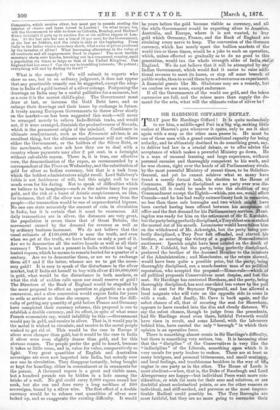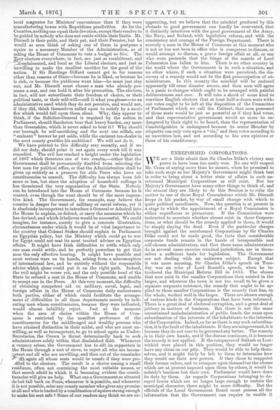SIR HARDINGE GIFFARD'S DEFEAT.
THAT poor Sir Hardinge Giffard ! It is quite melancholy to see him, a middle-aged Pert in a big wig, making little rushes at Heaven's gate whenever it opens, only to see it shut again with a snap as the other man passes in. He must be one of those men with a grand constitutional capacity for being unlucky, and be ultimately destined to do something great, say,
to deliver bad law in a crucial debate, or to offer advice the acceptance of which makes a powerful Ministry go down. He is a man of unusual learning and large experience, without personal enemies and thoroughly competent to his work, and he was chosen, right over the heads of all Parliamentary rivals, by the most powerful Ministry of recent times, to be Solicitor- General, and yet he cannot achieve what so many have found a merely formal task, his election to the House of
Commons. His party is disciplined as no party ever was dis- ciplined, till it could be made to vote the abolition of any Commandment except the Eighth—which, you see, would affect Consols—and he has had really extraordinary luck in vacancies, no less than three safe boroughs and two which might have been carried having been offered between his acceptance of office and the first demand for his Parliamentary services. Hunt- ingdon was ready for him on the retirement of Sir E. Kerslake, but the party being perfectly disciplined, a Tory eldest son snatched the morsel out of his mouth. Leominster would have Wren him on the withdrawal of Mr. Arkwright, but the party being per- fectly disciplined, a Tory Peer felt offended, and started his brother, so securing the victory of a popular Nonconformist auctioneer. Ipswich might have been carried on the death of Mr. J. P. Cobbold, but the party, being perfectly disciplined, preferred the brother of the deceased Member to the interests of the Administration ; and Manchester, as the return showed, would have been quite a possible prize, but the party, being thoroughly disciplined, ran a much-beaten man of no political reputation, who accepted the proposal—Home-rule--which of all political proposals Conservatives most despise, and lost the seat. Sir Hardinge has contested Horsham, and the party, being thoroughly disciplined, has sent one-third less voters to the poll than it sent for Sir Seymour Fitzgerald, and has allowed a local magnate who will vote on the opposite side to come in with a rush. And finally, Mr. Cave is back again, and the safest chance of all, that of securing the seat for Shoreham, appears to have receded into the dim and cloudy distance. We say the safest chance, though to judge from the precedents, had Sir Hardinge stood even there, faithful Petworth would have risen in revolt, and some Liberal, with the labourers behind him, have carried the only " borough " in which their opinion is an operative force.
There is something almost comic in Sir Hardinge's difficulty, but there is something very serious, too. It is becoming clear that the " discipline " of the Conservatives is very like the " indiscipline " of the Liberals, something upon which it is very unsafe for party leaders to reckon. There are at least as many intrigues, and personal bittemesses, and small mutintes„- and local feelings, and troublesome boulders in the way of tile engine in one party as in the other. The House of Lords is most obedient—when, that is, the Duke of Buccleugh and Lord Abergavenny are happy—but individual Peers want more con- sideration, or wish for seats for their sons and relatives, or are doubtful about ecclesiastical points, or are for other reasons as individual, and stiff-necked, and perverse as the most imprac- ticable Radical could possibly be. The Tory Boroughs are most faithful, but they are no more going to surrender their
local magnates for Ministers' convenience than if they were manufacturing towns with Republican proclivities. As for the Counties, nothing can equal their devotion, except their resolve to be guided by nobody who does not reside within their limits. Mr. Disraeli is their pride, and their pet, and their Premier, but he would as soon think of asking one of them to postpone a squire to a necessary Member of the Administration, as of asking the House of Commons to vote a budget en bloc. The ry electors everywhere, in fact, are just as recalcitrant, and ,opinionated, and local as the Liberal electors, and just as willing to make the smallest sacrifice for the good of the nation. If Sir Hardinge Giffard cannot get in for reasons other than reasons of State—because he is liked, or because he is rich, or because the publicans want him—he must just stay out, and Mr. Disraeli must choose a man who already pos- sesses a seat, and can hold it after his promotion. The electors, in fact, will not subordinate their freedom of choice, or their political taste, or their self-will--call it what you please—to an administrative need which they do not perceive, and would not, if they did, think themselves called upon to satisfy by a sacri- fice which would fall upon them alone. Why, they appear to think, if the Solicitor-General is required by the nation in Parliament, should Smoketon bear that heavy burden, any more than Greenshire, which is never asked to bear it ? Why should our borough be self-sacrificing and the next one selfish, our " eminent " brewer be put aside, while the eminent tea-dealer in the next county gratifies his ambition? We will not do it.
We have pointed to this difficulty very recently, and if we did our duty, should point it out again every week till it was remedied. The evil has reached a height under the legislation of 1867 which threatens one of two results,—either that the Government shall be permanently disabled from selecting the best men for political office, or that the Administration shall be given up entirely as a preserve for able Peers who have no constituencies to consult. The difficulty has always been felt more or less, but since the adoption of household suffrage it has threatened the very organisation of the State. Nobody can be introduced into the House of Commons because he is wanted, even though the want should be of the most impera- tive kind. The Government, for example, may believe the country in danger for want of military or naval reform, yet it is absolutely incompetent to introduce a General or Admiral into the House to explain, or defend, or carry the measures which he has devised, and which itbelieves would be successful. We could imagine, for instance, merely to give a concrete illustration, circumstances under which it would be of vital importance to the country that Colonel Stokes should explain in Parliament an Egyptian policy, but the Ministry which could go to war for Egypt could not seat its most trusted adviser on Egyptian affairs. It might have Irish difficulties to settle which only one man could settle, and be perfectly powerless to get that man the only effective hearing. It might have possible and most serious wars on its hands, arising from a misconception of international law, and be entirely without the responsible advice which alone could put it on the right path. Indeed, the evil might be worse yet, and the only possible head of the State be refused a seat in the House of Commons, and unable to accept one in the Peers. At this very moment, the difficulty of obtaining competent aid on military, naval, legal, and foreign affairs in the House of Commons daily embarrasses both parties, either of which could facilitate the arrange- ment of difficulties in all those departments merely by indi- cating men whom constituencies, because they were indicated, would almost infallibly reject. Just at the moment when the area of choice within the House of Com- mons is restricted by the manifest preference of the constituencies for the middle-aged and wealthy persons who have attained distinction in their midst, and who are most un- willing, as well as incompetent, to go to school again as Under- Secretaries, the Crown is thrust determinedly back to seek administrators solely within that diminished field. Whenever a vacancy arises, the Government has to sift its supporters in the House through a sort of sieve, to reject all who are incom- ttent and all who are unwilling, and then out of the remainder ,F' aft _again all whose seats would be unsafe if they were pre- itithd to the electors. The result is a choice among a small residuum, often not containing the most suitable names, or that search afield in which it is becoming evident the consti- tuencies will give no help. What can a Government so situated do but fall back on Peers, whenever it is possible, and whenever it is not possible, seize any county member who gives any promise at all and who is backed by a combination of squires strong enough to make his seat safe Some of our readers may think we are ex- aggerating, but we believe that the mischief produced by this obstacle to good government can hardly be over-rated, that it distinctly interferes with the good government of the Army, the Navy, and Ireland, with legislative reform, and with the consistency and courage of the Foreign Department. There is scarcely a man in the House of Commons at this moment who is not or has not been in office who is competent to discuss, or would attempt to discuss, a grave foreign affair at all, or one who even pretends that the fringe of the mantle of Lord Palmerston has fallen to him. There is no other country in the world where the Government is in such a situation, and no other where, if such a situation were perceived, the dis- covery of a remedy would not be the first preoccupation of ad- ministrators. In this country the mischief will be endured apparently till some disaster occurs, and then men will agree in a panic to changes which ought to be arranged with painful deliberateness and care. It will take a shock of some kind to convince English electors that at least half-a-dozen seats with- out votes ought to be left at the disposition of the Committee of Parliament which we call the Cabinet, that men possessed of those seats would be just as powerful as if they had votes, and that representative government would no more be en- dangered by their right to be heard, than the representation of Cambridgeshire is endangered because its senior Member by etiquette can only vote upon a " tie," and then votes according to an unwritten law, and not according to his own opinions or those of his constituency.



































 Previous page
Previous page